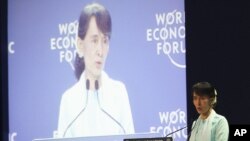Burma's democracy leader Aung San Suu Kyi is urging business and political leaders to invest responsibly in her country. Addressing the World Economic Forum on East Asia, Aung San Suu Kyi said there is too much "reckless optimism" surrounding Burma’s reform efforts.
Aung San Suu Kyi told the forum there is too much focus on Burma's economic reforms and not enough on political ones.
"Even the best investment law would be of no use whatsoever if there are no courts that are clean enough and independent enough to be able to administer those laws justly," she said. "This is our problem. And, so far, we have not been aware of any reforms on the judicial front."
She urged responsible investment in Burma to help create jobs, calling youth unemployment a "time bomb."
"We do not want investment to mean greater inequality," she added. "We do not want corruption to mean greater privileges for the already privileged. We want investment to mean, quite simply, jobs, as many jobs as possible. It’s as simple as that."
Over the years Burma's poor economy and unemployment have led migrant workers to seek opportunity in Thailand, where about 2 million now live.
"I really want to see Aung San Suu Kyi so I don't care if I'm punished for my absence from work. It is a rare opportunity to see her, maybe once in a lifetime," said Sai Sai, a migrant worker.
Meeting with the Burmese migrant and refugee community was a top priority of her first trip outside Burma in 24 years, but her presence among 600 business and political leaders at the World Economic Forum drew the most attention.
Helene Gayle is president and CEO of CARE, a U.S.-based aid organization and co-chair of the forum.
"What she's doing by being here, is incredibly significant," said Gayle. "It begins that opportunity for a dialogue that I think will be very important for Burma but also for the rest of this region."
The Vahu Development Institute's Aung Thu Nyein backs up Aung San Suu Kyi's focus on jobs, because he says most foreign investment in Burma is still centered on extracting natural resources.
"This is my biggest concern you know," he said. "The investment just pouring into the country will be working mostly on the extractive service sectors rather than, you know, to employ people in the country and to develop the system in the country."
With Aung San Suu Kyi in parliament, and now traveling the world stage, Burma's aspirations for improvement now have a well-respected voice.
Aung San Suu Kyi told the forum there is too much focus on Burma's economic reforms and not enough on political ones.
"Even the best investment law would be of no use whatsoever if there are no courts that are clean enough and independent enough to be able to administer those laws justly," she said. "This is our problem. And, so far, we have not been aware of any reforms on the judicial front."
She urged responsible investment in Burma to help create jobs, calling youth unemployment a "time bomb."
"We do not want investment to mean greater inequality," she added. "We do not want corruption to mean greater privileges for the already privileged. We want investment to mean, quite simply, jobs, as many jobs as possible. It’s as simple as that."
Over the years Burma's poor economy and unemployment have led migrant workers to seek opportunity in Thailand, where about 2 million now live.
"I really want to see Aung San Suu Kyi so I don't care if I'm punished for my absence from work. It is a rare opportunity to see her, maybe once in a lifetime," said Sai Sai, a migrant worker.
Meeting with the Burmese migrant and refugee community was a top priority of her first trip outside Burma in 24 years, but her presence among 600 business and political leaders at the World Economic Forum drew the most attention.
Helene Gayle is president and CEO of CARE, a U.S.-based aid organization and co-chair of the forum.
"What she's doing by being here, is incredibly significant," said Gayle. "It begins that opportunity for a dialogue that I think will be very important for Burma but also for the rest of this region."
The Vahu Development Institute's Aung Thu Nyein backs up Aung San Suu Kyi's focus on jobs, because he says most foreign investment in Burma is still centered on extracting natural resources.
"This is my biggest concern you know," he said. "The investment just pouring into the country will be working mostly on the extractive service sectors rather than, you know, to employ people in the country and to develop the system in the country."
With Aung San Suu Kyi in parliament, and now traveling the world stage, Burma's aspirations for improvement now have a well-respected voice.
Some information for this report was provided by AP, AFP and Reuters.





